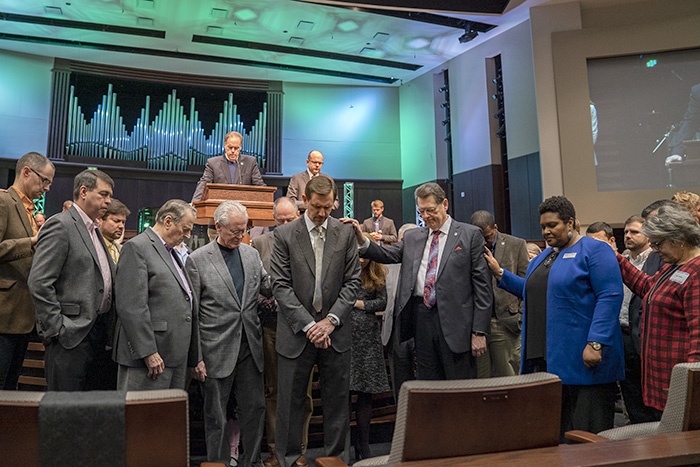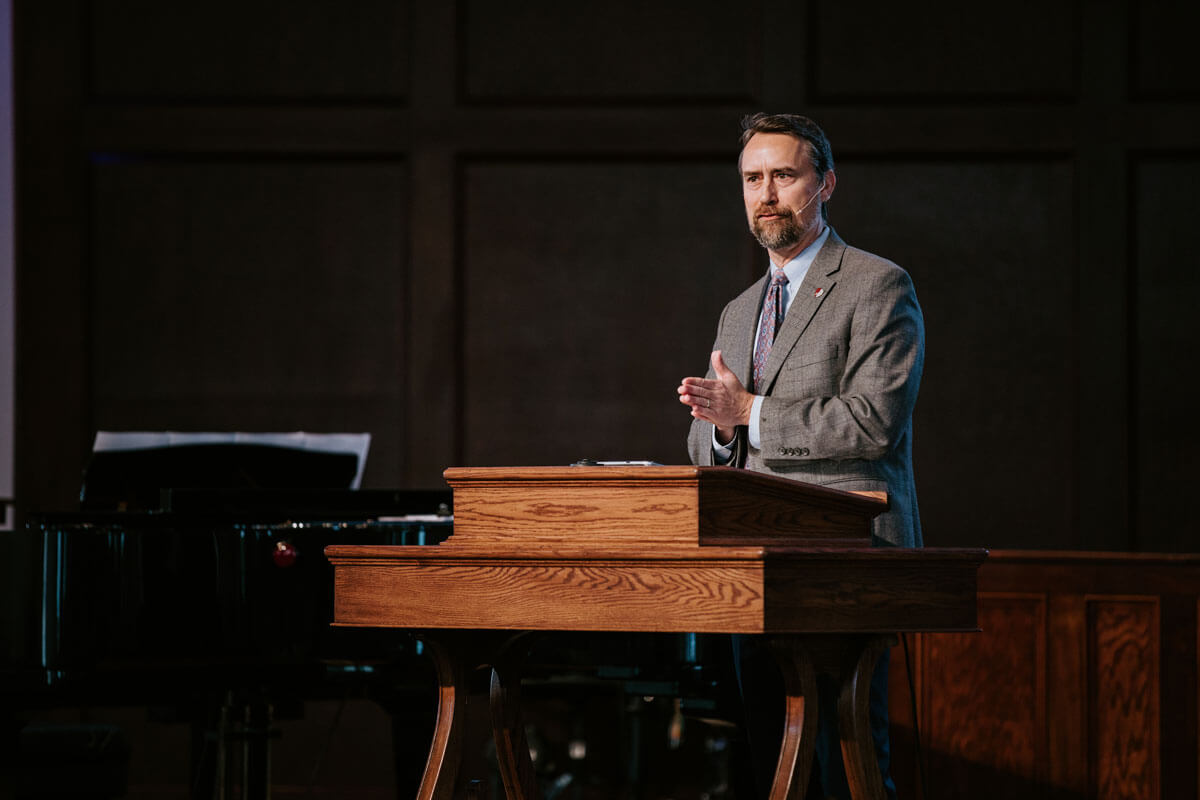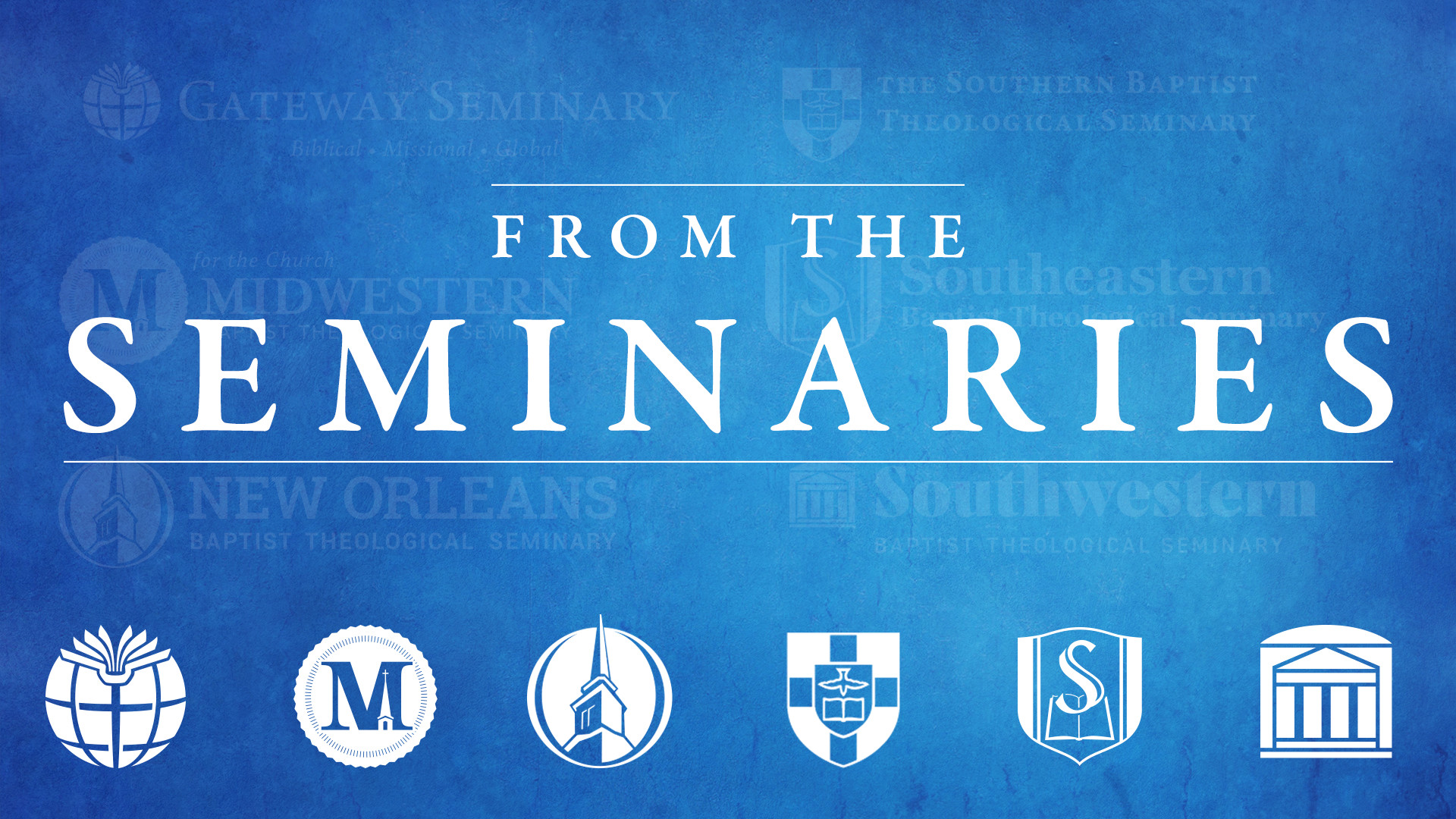
Chitwood to SWBTS: ‘Much Great Commission work to be done’
By Alex Sibley
FORT WORTH, Texas (BP) — Today, 155,252 people around the world will die lost and enter into a Christ-less eternity, International Mission Board President Paul Chitwood told The Southwestern Baptist Theological Seminary chapel audience Feb. 27.
Chitwood preached Revelation 7:9-10, wherein John sees a vision of “a vast multitude from every nation, tribe, people, and language” standing “before the throne and before the Lamb,” clothed in white robes and praising God. Chitwood explained that, for 2,000 years, “the church has remained on earth for the very purpose of accomplishing this vision.”
“Why would the Lord, who loves His sons and daughters, whom He has adopted into His family, not bring us home to be with Him?” Chitwood asked. “Because there are others. The Lord has left us here for them.
 “The Lord has left us here with a mission and with the great confidence that the mission that we undertake can and will be accomplished.”
“The Lord has left us here with a mission and with the great confidence that the mission that we undertake can and will be accomplished.”
In addition to Chitwood’s sermon, the chapel service featured the celebration of the one-year anniversary of Adam W. Greenway’s election as the ninth president of Southwestern Seminary. Danny Roberts, who chaired the presidential search committee that selected Greenway and currently serves as vice chairman of the seminary’s board of trustees, recognized and prayed over Greenway at the beginning of the service. He rejoiced that, though “it’s been a great year” and “God has done some amazing things,” “it’s only just begun, and the best days of Southwestern Seminary are out ahead of us right now.”
Following Roberts’ prayer, Greenway invited his wife, Carla, to join him on stage, and he shared that “it has been the greatest year of our married life and of our ministry to have served as your president now for one calendar year.” He added that he could not be president at Southwestern “if not for the president’s wife, Carla Greenway.”
During his sermon, Chitwood analyzed the “who,” “where,” “how,” and “why” of John’s Revelation 7 vision. Chitwood noted that the adjective “every” is significant, for it means that heaven is inclusive — that is, people from across the globe may stand before the throne of God through faith in Christ. This requires carrying the Gospel to the ends of the globe, Chitwood said.
“There is still much Great Commission work to be done. And that’s why you’re here,” said Chitwood. “You’re here because the ‘who’ of the vision are still out there; they’re yet to be reached.”
The “where,” Chitwood said, is before the throne and before the Lamb. As for how people may stand in such a position “clothed in white robes,” Chitwood explained, “That’s the how of salvation.”
“The law was fulfilled,” he said. “Our sorrow was borne. Our curse was carried. Our debt was paid. Our iniquities were washed away. Judgment for our sins was carried out on Him. God’s wrath was satisfied. His wounds brought us healing. Our sins were atoned for as the Messiah came and the Lamb was slain. And in His death, He brought us life.”
Therefore, Chitwood said, “as we share His Gospel by the work of the Holy Spirit, the lost are saved, the orphan adopted, the unworthy made worthy, the sin-stained soul washed by the blood, the slave redeemed, the blind given sight, sinners welcomed — clean and pure and adorned in white robes — into the very presence of God before the throne and before the Lamb.”
Regarding “why,” Chitwood pointed to the multitude’s praise, “Salvation belongs to our God, who is seated on the throne, and to the Lamb!”
God “deserves to be praised in every language He has placed upon the tongues of men,” Chitwood said. “And for all eternity, He will be praised.”
“For every one of you, my encouragement today is simply this: take your place, whether it’s here or at the very ends of the earth,” Chitwood concluded. “Do your job. Be on mission. Answer the call. Go. Because the Lord is coming for those who are His, and there are still 155,252 who, just today, will die lost. Don’t forget that number.”
Following Chitwood’s sermon, Greenway invited the Southwestern Seminary and Scarborough College community to gather around Chitwood to pray for him and, through him, “for all our international missionaries, for those serving in Richmond and literally in every time zone around the world.”” Brent Ray, director of the seminary’s World Missions Center, led the prayer.
“We pray for our missionaries,” Ray said. “Help us to hold the rope through our giving, our going, our praying.
“Father, we thank you for allowing us to be a part of this task. And for the 155,252 today, God, enable us, that one less [would die lost] because we fearlessly shared Jesus with someone today.”
**********
MBTS Sizemore Lectures focus on church fathers
By T. Patrick Hudson
KANSAS CITY, Mo. (BP) — New Testament and canonical scholar Michael Kruger delivered Midwestern Seminary’s annual Sizemore Lectures on Feb. 25-26, exploring the topic of “Were the Church Fathers Inspired in the Same Way as Scripture?” when selecting the biblical canon.
 Kruger, who serves as president and the Samuel C. Patterson professor of New Testament and early Christianity at Reformed Theological Seminary’s Charlotte campus, focused his two-lecture series on the questions: “Were the church fathers inspired in the same way as Scripture?” and “How did early Christian identify inspired books?”
Kruger, who serves as president and the Samuel C. Patterson professor of New Testament and early Christianity at Reformed Theological Seminary’s Charlotte campus, focused his two-lecture series on the questions: “Were the church fathers inspired in the same way as Scripture?” and “How did early Christian identify inspired books?”
In a highly-engaging style, Kruger offered insights from a number of opposing scholars who claim that the early fathers saw nothing distinctive about the New Testament writings as compared to writings being produced in their own time period.
Ultimately, however, Kruger finds this view problematic and asserted that the early church fathers, in fact, accepted some books of the canon because they were inspired and rejected other books because they were not.
In his first lecture, Kruger outlined arguments — particularly from scholar Everett Kalin — that posited the early church fathers did not see inspiration as something uniquely true of canonical books because the early church fathers saw their own writings as inspired.
In disproving this theory, Kruger noted that “early Christians did use inspiration-like language for sources outside the Scriptural writings. It was not unusual, for example, for church fathers to claim that they were speaking or writing through the Holy Spirit.”
Kruger explained that several pieces of evidence exist that suggest church fathers used inspiration language in different ways — some of which was applicable to Scripture, and some of which was applicable to lower or lesser authorities.
First, such evidence included that some church fathers used inspiration language even when referring to pagan writers like Plato. Second, many supposed examples of the church fathers’ use of inspiration are instances where a writer simply acknowledges how the Spirit is working within the church. Third, some church fathers may have considered some of these “extrabiblical” books to be inspired like Scripture.
Of this, Kruger explained, “Thus, they didn’t have a wider view of inspiration, just a wider view of the canon.”
Fourth, early Christian sources viewed the apostles as speaking with a distinctive divine authority on par with the OT prophets. Thus, there is a higher form of inspiration that superseded the church fathers. And fifth, a number of patristic writers expressly differentiated levels of inspiration.
In his second lecture, Kruger explored ways to determine whether early church fathers possessed a distinctive way to identify biblical books as inspired, and is it still possible to do so today?
Kruger stated that early Christians believed apostolic books were self-authenticating, which meant they possessed certain qualities that revealed their divine character.
“It’s not so much that books claim to be divine, although some do,” Kruger said, “But they evidence themselves to be divine by their internal qualities.”
Such qualities, Kruger suggested, are the beauty and excellency of Scripture, the power of Scripture, and the unity of Scripture.
Particularly of this last attribute, Kruger said that uninspired works are apparent by their lack of unity.
Speaking of the church fathers, Kruger noted, “They were always quickly able to point out if a book was not from God by simply pointing out how it made errors, how it had mistakes, and how it contradicted prior revelation. This is how the church fathers beat back the apocryphal gospels, as they would often show this was the case. So, this is a fascinating aspect here, that what you have is now a third quality that shows indeed this unity and harmony is a marker of God’s own divine authorship.”
Another point of interest Kruger proposed is that to understand Scripture as inspired, one must rely on the help of the Holy Spirit.
“The natural man does not receive the things of the Spirit,” Kruger explained. “If you’re going to observe divine qualities of the Spirit, then you have to have the Spirit (within you) to observe those divine qualities correctly. So, what the fathers would argue is: that through the fall and through the training of sin, men cannot apprehend rightly what the Scripture actually is.
“In other words, to put it differently, when people don’t recognize the Bible as the Word of God, the problem isn’t the Bible. The problem is their ability to perceive…it’s almost like the non-Christian is spiritually tone deaf.”
Kruger concluded by emphasizing that the best way for one to acknowledge the self-authenticating nature of inspired biblical text, and to come into a belief of its precepts, is “simply by reading it and hearing it.”
The Sizemore Lecture series was established in 1978 in memory of Dr. Burlan A. Sizemore, Jr., professor of Old Testament and Hebrew at Midwestern Seminary from 1968-1976. This annual lecture series brings noted biblical scholars to Midwestern Seminary’s campus as a way of continuing Sizemore’s legacy of theological and biblical commitment.
To view the lecture series, visit https://www.mbts.edu/2020/02/chapel-with-dr-michael-kruger-sizemore-lectures/.
















